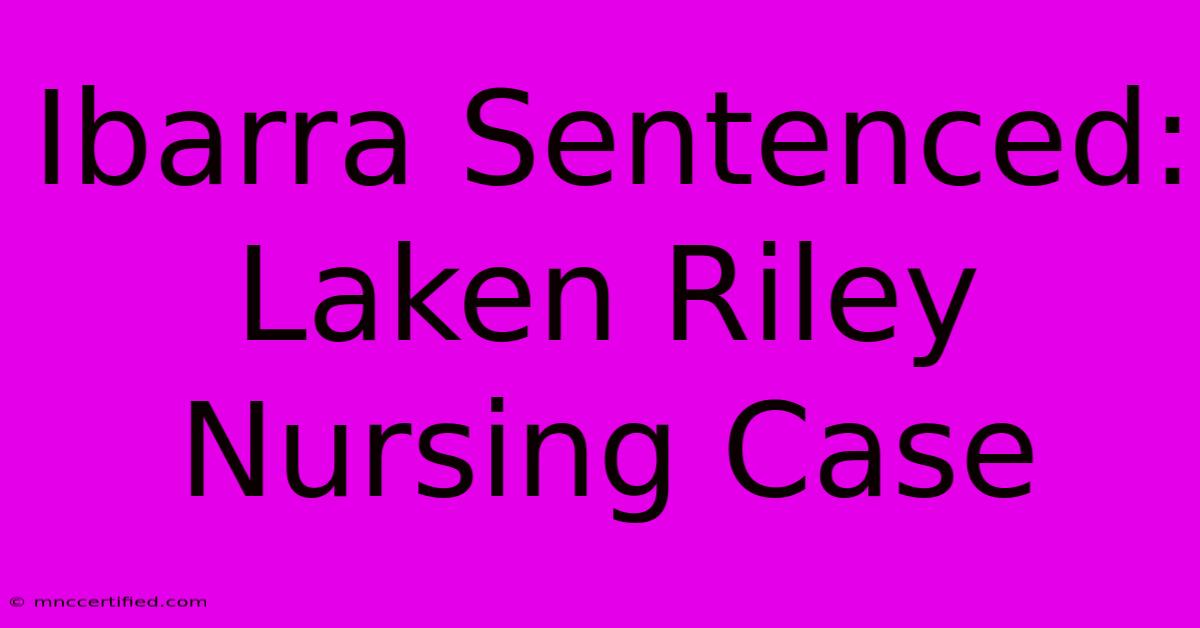Ibarra Sentenced: Laken Riley Nursing Case

Table of Contents
Ibarra Sentenced: The Laken Riley Nursing Case and its Implications
The sentencing of nurse William Ibarra in the tragic case of Laken Riley has sent shockwaves through the nursing community and beyond. This case, highlighting severe medical negligence and a failure in the system, underscores the crucial importance of patient safety and accountability within healthcare. This article delves into the details of the case, the sentencing, and its broader implications for nursing practice and patient advocacy.
The Laken Riley Case: A Tragedy of Neglect
Laken Riley, a young child, tragically passed away due to profound medical neglect. At the heart of the case was the alleged failure of nurse William Ibarra to provide adequate care, leading to Laken's preventable death. Specific details surrounding the neglect varied in different court documents and news reports, but the core issue centered around inadequate monitoring and delayed or absent intervention in the face of Laken's deteriorating condition. This alleged failure resulted in devastating consequences. The case highlighted a systemic failure, prompting investigations into protocols and training within the relevant healthcare facility. The exact nature of the negligence will continue to be debated, but the outcome—the loss of a young life—remains undeniably tragic.
Key Questions Raised by the Case:
- Systemic Failures: Did the hospital have adequate staffing levels? Were protocols for monitoring critically ill patients properly followed? Was there sufficient training and oversight of nursing staff? These questions remain critical in understanding the full context of Laken's death.
- Individual Responsibility: What specific actions or inactions of nurse Ibarra directly contributed to Laken's death? The court proceedings focused on this aspect, ultimately leading to his conviction and sentencing.
- Patient Advocacy: What mechanisms are in place to protect vulnerable patients and ensure their voices are heard? The Riley family’s struggle to obtain justice highlights the need for stronger patient advocacy systems.
The Sentencing of William Ibarra: Accountability and Justice
The sentencing of William Ibarra marked a significant conclusion to the legal proceedings. While the specific details of the sentence may vary depending on the reporting source, it's crucial to understand that the sentence represents an attempt to hold an individual accountable for their actions. The severity of the sentence reflects the gravity of the alleged negligence and the irreversible consequences for Laken Riley and her family. The sentence serves as a reminder that healthcare professionals have a critical responsibility to provide safe and competent care. Failure to meet this responsibility can have severe legal and ethical repercussions.
Beyond the Sentence: Lessons Learned
The Ibarra sentencing is more than just a legal conclusion; it’s a crucial moment for reflection and reform within the healthcare system. This case underscores the need for:
- Improved Training: Enhanced training programs for nurses, focusing on critical patient assessment, timely interventions, and effective communication.
- Strengthened Protocols: Clearer and more rigorous protocols for monitoring patients' vital signs and escalating concerns.
- Increased Accountability: Stronger mechanisms for holding healthcare professionals accountable for negligence and malpractice.
- Enhanced Patient Advocacy: Increased support and resources for patients and their families to navigate the complexities of the healthcare system.
The Lasting Impact: Changes in Healthcare Practice
The Laken Riley case and the subsequent sentencing of William Ibarra have undoubtedly spurred discussions about changes in healthcare practice. The case highlights the need for ongoing vigilance and commitment to patient safety. Hospitals and healthcare systems across the country are likely reviewing their own protocols and training programs in light of this tragic event. The ultimate goal is to prevent similar tragedies from occurring in the future. This requires a multi-faceted approach, including improved staffing, better training, and a stronger focus on patient advocacy.
Keywords: Laken Riley, William Ibarra, nursing negligence, medical malpractice, patient safety, healthcare accountability, hospital protocols, nursing training, patient advocacy, sentencing, healthcare reform.
(Note: This article provides a general overview. Specific details regarding the sentencing and the case may vary depending on the source. Always refer to official court documents and reputable news outlets for the most accurate information.)

Thank you for visiting our website wich cover about Ibarra Sentenced: Laken Riley Nursing Case. We hope the information provided has been useful to you. Feel free to contact us if you have any questions or need further assistance. See you next time and dont miss to bookmark.
Featured Posts
-
Erie Insurance Christiansburg Va
Nov 21, 2024
-
Corrective Jaw Surgery Insurance
Nov 21, 2024
-
Insurance Companies Kingsport Tn
Nov 21, 2024
-
Buy Crypto With American Express
Nov 21, 2024
-
Don Bullard Insurance Wilmington
Nov 21, 2024